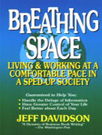Bad Sleep = Bad Day - Breathing Space Blog
I revisited an article on the prevalence of sleep disorders in our society. As communication technology grows ever more powerful, and people are more likely to abuse rather than effectively use technology, what are the chances that sleep disorders will decline? Where is the Breathing Space?:
“Poll finds sleep disorders on the rise in U.S.”
April 2, 2002
(CNN) -- A poll on the sleeping habits of U.S. residents released Tuesday found the number of Americans reporting trouble sleeping is on the rise, as is the number of people who use medications to help get some shuteye. The latest "Sleep in America" poll, commissioned by the National Sleep Foundation, found that respondents were getting average of 6.9 hours of sleep on weekdays and 7.5 hours on the weekend.
Seventy-four percent of respondents in the study reported experiencing at least one symptom of a sleep disorder a few nights a week or more. That number was up significantly from 62 percent in 1999 and 2000, and from 69 percent last year. Those symptoms include difficulty falling asleep, waking up a lot during the night, waking up too early and not being able to go back to sleep, waking up feeling unrefreshed, snoring, having tingling feelings in the legs, or pauses in breathing.
Pollsters found that 68 percent of respondents were getting less than eight hours of sleep on weeknights and that they sought to make up for it on the weekend, when 52 percent said they got eight hours of sleep or more. Respondents noted that not getting enough sleep made them feel more irritable, more likely to lose their patience around children, and to get angry while driving.
Meanwhile, the number of people who reported using medication to help them fall asleep was also on the rise. Fifteen percent of people surveyed said they had used either a prescription or over-the-counter drug for sleep, up from 11 percent in 2001.
The poll found that men, on average, got less sleep than women, though women were more likely to report symptoms of insomnia than men. On average, people between the ages of 18 and 29 got the least amount of sleep, while those 65 or over got the most. Adults living with children got less sleep that those without children. And people in the Western U.S. got the most sleep each day, while residents of the Midwest and Northeast slept the least.
Labels: fatigue, fitful, insomnia, sleep disorder, technology, toss, US


























.jpg)


0 Comments:
Post a Comment
<< Home